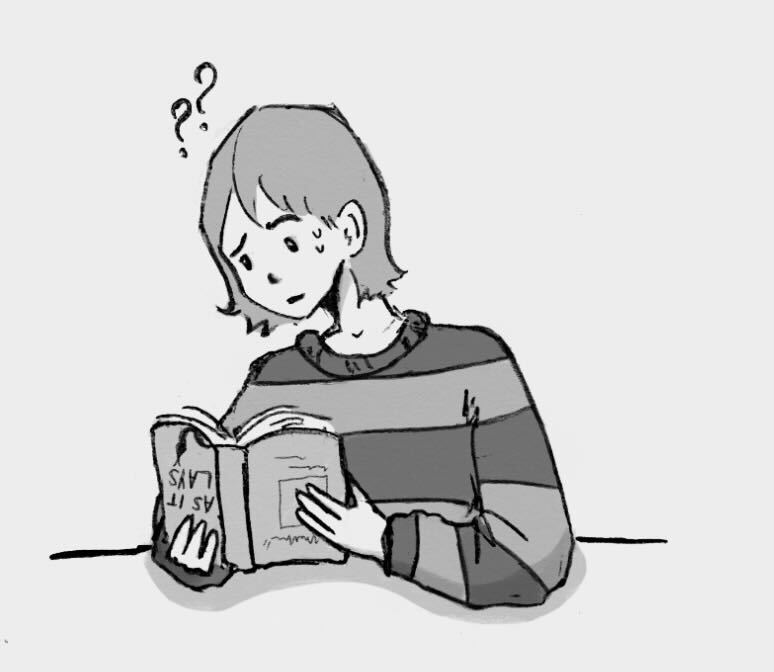Opinion | BookTok is a mistake


One of the guiding principles of my life is to not ask people what books they read because it either depresses me or makes me feel like a pretentious loser. Do I abide by it successfully? No. Is it funny to go on a first date with a guy who “reads a lot” and then explains the plot of a Hemingway novel incorrectly? Yes.
However, my willingness to make fun of the way men pretend to know how to read is one thing, informed and sustained by the centuries of breast-focused literature they’ve inflicted on the world. It’s another thing entirely for me to make fun of teenage girls for how and what they read, a disclaimer as I prepare to add yet another layer of criticism to the already large pile, courtesy of BookTok, which is responsible for the heightened emergence of three incredibly annoying and somewhat worrying social phenomena.
The first group is the industry-makers, who loyally follow a format and vernacular for discussing books. The TikTok videos read as unpaid ads for books, listing the tropes they contain. Most are romance novels written in the last five years. Rather than waste time on the plot, these creators describe the themes as “enemies to lovers,” “brother’s best friend,” “workplace romance,” and so on.
Recently, authors have joined the platform to talk about their own books the way that an unpaid BookToker would. They list the tropes and use pictures from Pinterest. It’s only clear that the video is an advertisement for the author at the end of the video. Otherwise, they’re virtually indistinguishable from the thousands of others.
Setting aside for a moment how insidious this form of advertising is, it’s fascinating to see the influx of successful writers who would have been rejected by most publishers if TikTok weren’t around. What’s most alarming is not having to witness conservations between adults and teenagers using the word “seggs,” or even to see writers advertising by listing tropes, it’s that the books they’re doing all of this for are thoroughly, catastrophically bad.
I am a woman of my word, and I didn’t want to write about these books without giving them a fair shot, even if they’re not to my taste at all. There are a few main categories, outside of the “trope lists” — sports romance, office romance, fantasy romance and regular romance with socially relevant undercurrents. It has been a genuinely miserable week of my life, trudging through as many of the most popular books from each genre as I could.
The last category, despite seeming the most normal on the surface, is the most worrisome. The subcategory has a champion, of course. Colleen Hoover is to TikTok industry-generated romance as John Grisham and James Patterson are to airport novels. Her most popular novel, “It Ends With Us,” has sold four million copies and, along with being the most controversial of the books popularized by TikTok, is one of the worst books I’ve ever read.
Without entering too much into the plot, it’s about domestic abuse. This book is meant to be a harrowing, melancholic analysis of how devastating violence is when it comes from someone you love. Shockingly, it does not manage this, instead taking what is a frequent, devastating experience and turning it into a soap opera.
While I don’t have much else to say about Hoover and the genre she belongs to, the second subculture spawned by BookTok does. The strongest criticisms of the loyal fans come from fellow app users who believe that books with problematic themes or authors are inherently bad, despite not managing to agree on what constitutes being problematic. When I first came across this part of the BookTok community, I was intrigued, expecting the usual objections to “Lolita” ignoring Nabokov’s intentions, or Conrad and Bronte, for the inextricable racism in their novels, as most of the users are students who often read their novels in class.
As per usual when it comes to TikTok, I was dead wrong. After a few days of watching these videos, I realized that this subgroup is just a bunch of people at each other’s throats about whether fictional infidelity is intrinsically wrong. While this particular brand of depressing media literacy is mostly limited to books that only the people with dogs in this fight would read, the premise that a book loses all credibility if an author is scandalous is quickly becoming more popular. A ridiculous list of “authors to avoid” circulated on Twitter recently, with Shakespeare and Anne Sexton on the same list as John Green and Stephanie Meyer, with their alleged problematic behavior listed.
Finally, the last group created by BookTok — and the one that positions itself as intellectually superior to the last two — relies heavily on the over-identification, categorization and commodification of “vibes” or “aesthetics.” The increased popularity of the app and the microtrends entirely specific to TikTok have created a totally new way of engaging with media and basing a personality on it.
Now you have “Donna Tartt, overly annotated copy of a Greek tragedy, Oscar Wilde” people, who read mostly to reference what they’ve read, with an upsettingly weak grasp on the meaning. Or there’s “Sylvia Plath and Joan Didion, Richard Siken quotes out of context, female manipulator era” people who want to be seen as iconoclasts, despite not knowing how to inhale their cigarettes correctly.
“Cool girl” BookTok is deeply white, vaguely classist — with hints of poorly-done Marxist posturing — and soulless. The few authors of color who make it into the compilations are rewarded by seeing their work fragmented over videos of white women experiencing mild changes in their lives while Fiona Apple plays if they’re lucky. If not, it’s Taylor Swift.
The problem with this method of interacting with literature is that it is robbed of context. It’s one thing to find a quote or a fragment beautiful, it’s another thing entirely to only engage with poetry in “compilations” that stitch together mangled pieces of poems, or to read Russian novels for the pleasure of being seen with them. To read books written by brilliant people in pain, books that have been written with intentionality every step of the way, and to have done so with the goal of being a “cool girl,” and to have understood maybe half of them, is a win for commodification, and little else.
You’re not in your “It girl, reading for fun, romanticizing my life” era, you’re becoming functionally illiterate and incapable of reading books that aren’t written according to an industry standard literally informed by a genuine defense of fanfiction.
Finally, I do not think we are effectively combating misogyny by promoting anti-intellectualism. TikTok is doing enough of that already. There’s a reason that critically acclaimed writing reaches the heights that it does, and there’s a reason that some novels stand the test of time, and some don’t. While tastes and preferences will always vary, talent, thoughtfulness and hard work are enduringly visible in literature worth reading, and sorely lacking in the books being popularized in this way.
BookTok is not encouraging young women to read, it’s generating ignorant conversations centered around poorly written, depressingly similar books. Even at its best, it is promoting the idea that young women should base their identities off of a few stolen personality traits from books they’ve been told to read solely for the image it will give them.
Sofia Uriagereka-Herburger writes about politics and international and domestic social movements. Write to her at sou5@pitt.edu.
Recent Posts
‘He’s off to a much faster and better start’: Republicans reflect the second Trump administration’s first two months
Since Inauguration Day Trump’s second term has caused division amongst young Americans. Despite these controversies,…
Who Asked? // Why do we accept bad treatment from people?
This installment of Who Asked? by staff writer Brynn Murawski attempts to untangle the complicated…
What, Like It’s Hard? // Lean on your people
Contributing editor Livia LaMarca talks about leaning on your support networks and gives advice on…
Note to Self // Hot Girl Summer
In the sixth edition of Note to Self, Morgan Arlia talks about how she is…
A Good Hill to Die On // Down to Date and Time
In the latest version of “A Good Hill to Die On,” staff writer Sierra O’Neil…
‘Dress for Success: Closet to Career’ alleviates the stress of building a professional wardrobe
As the end of the spring semester rapidly approaches, many Pitt students find themselves in…

